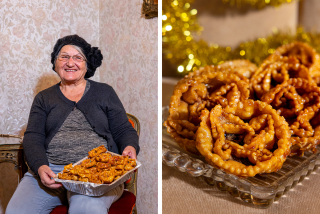Search for Dinnerware Leads Artists to Set Up Business
- Share via
CHESTER, Conn. — Tucked away in this sleepy town is a store that is carrying on a tradition begun in 15th-Century Italy.
In a shop they call Ceramica, Carol LeWitt and Carol Huebner sell Italian majolica, brightly colored, ornately painted earthenware made in Deruta, Italy.
LeWitt, 34, and Huebner, 41, own a second shop in New York City’s Little Italy and plan to open another in West Hartford, Conn., to accommodate a rapidly expanding business that grew, appropriately, out of a need for a new dinner set.
In 1979, LeWitt and her husband, artist Sol LeWitt, moved to Spoleto, Italy, and were looking for dishes for their home.
Huebner and her husband, painter Michael Venezia, were visiting at the time, and the four decided to drive the 40 minutes from Spoleto to Deruta to see the pottery that, for centuries, has formed the livelihood of local artisans.
Sol LeWitt, watching the craftsmen, had an idea.
“The first thing he said was, ‘If I bring in a drawing, could you make it for me?’ ” his wife said, adding that the question started her thinking.
“I thought, I spent all those years at art school, I could do that, too,” she said.
LeWitt and Huebner, a professional photographer who majored in ceramics in college, began researching the history of majolica, learning traditional patterns and color schemes and visiting with the craftsmen.
They discovered that the artisans had cabinets full of pottery shards that had been collected for generations. As LeWitt and Huebner discussed design, the craftsmen would through the shards and pull out a classic pattern that hadn’t been used for some time.
“We got so we could sit down with a potter and say, ‘Look, it has to be this way,’ and then sit down with the painter and say, ‘Do you remember . . .,” said LeWitt, whose fluency in Italian helped convey their wishes. “Because they were craftsmen and not artists, they listened.”
LeWitt said the artisans at first were skeptical.
“They thought we were dilettantes, that we were just doing this for the fun of it,” she said. “They never thought there would be a business in it.”
Then, in the mid-1980s, the Museum of Modern Art in New York bought a dinner set designed by Sol LeWitt, whose art has been internationally exhibited.
“That was the first time the artisans had a serious validation that what they could do could be considered art,” his wife said.
The business from LeWitt and Huebner couldn’t have come at a better time for the craftsmen, because after centuries of a thriving pottery tradition, it had started to dry up.
“It used to be in Italy that every town had its own style,” Huebner said. “There are towns that have lost the tradition. . . . But we think we’ve rejuvenated the business a bit.”
Although they both live in the United States--Huebner in New York, LeWitt in Chester--they have an assistant in Italy and travel about four times a year to the factories to oversee production.
Although other stores sell majolica, the two say they are able to sell it for less because they import it themselves.
“There’s no middleman,” Huebner said. “We also know who does the best pottery.”
Prices for most pieces range from $2.75 to a few hundred dollars, with most in the $20 range. A five-piece dinner set sells for about $100.
“Our idea was the things needed to be useful,” LeWitt said. “You should use your $7.95 mug every day, and if it chips it won’t break your heart.”
More to Read
Inside the business of entertainment
The Wide Shot brings you news, analysis and insights on everything from streaming wars to production — and what it all means for the future.
You may occasionally receive promotional content from the Los Angeles Times.









